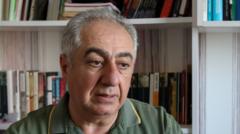Human rights groups have accused the Azerbaijani government of using the COP29 climate summit as a cover for the repression of environmental activists and other political adversaries. This claim marks the third consecutive year that a host country for the climate talks has faced such allegations. The Climate Action Network, comprising nearly 2,000 environmental organizations, emphasizes the protection of civil society as crucial for genuine advancements in climate action.
As world leaders converge in Azerbaijan to address climate change solutions, rights organizations have demanded a reevaluation of the criteria for selecting host countries. They warn of a disturbing uptick in the number of political prisoners in Azerbaijan, with Natalia Nozadze from Amnesty International stating the situation has deteriorated since the country was chosen to host COP29 last November. “There’s been a dramatic spike in arrests for any dissent against the government,” Nozadze remarked.
Currently, over 300 political prisoners—including journalists, activists, and opposition figures—are in custody, marking a significant rise not seen since the early 2000s, according to the Union for Freedom of Political Prisoners in Azerbaijan. Among them is Gubad Ibadoglu, a 53-year-old professor at the London School of Economics, who has been under house arrest for nearly 18 months on dubious charges of fraud. His daughter has appealed to UK officials for assistance in securing his release, highlighting the perceived dangers he faces due to his health conditions.
Environmental advocates are demanding Azerbaijan reduce its dependence on oil and gas—both of which comprise a considerable portion of the government’s revenue. Despite this, President Ilham Aliyev recently reaffirmed the country’s commitment to oil and gas in front of COP29 delegates, declaring that these resources are “a gift from God.” Critics have pointed out the irony of hosting climate talks while simultaneously planning to expand fossil fuel production.
Several other activists, such as Anar Mammadli, face serious charges following their advocacy for environmental policies that comply with the Paris agreement. Mammadli, who was arrested shortly after co-founding a significant environmental organization, adds that civil society voices essential for accountability have been marginalized leading up to COP29.
Nazim Beydemirli, sentenced to eight years for extortion after opposing mining operations, exemplifies a broader trend of stifling dissent in Azerbaijan as authorities position themselves favorably on the international climate stage. Critics like Azerbaijani journalist Emin Huseynov argue that countries such as Azerbaijan should not be eligible to host global summits if they consistently violate human rights.
During COP29, Azerbaijani officials—while rejecting claims of human rights abuses—defend their stance by stating they do not discriminate against any participants in the climate talks, including civil society members. However, international concerns persist, with prominent human rights advocates urging the UN to enforce strict criteria for future COP hosts to prevent the exploitation of these events for political gain.
The UN, while supportive of allowing protests at COP, faces criticism over its limited influence regarding human rights issues in host countries. Tasneem Essop, the executive director of a prominent climate advocacy group, stresses that the dwindling space for civil society participation globally complicates collective action on climate change, which fundamentally relies on these voices to advocate for justice and accountability.
As discussions continue in Azerbaijan, the international community witnesses a troubling overlap where climate negotiations and human rights violations intersect, leading to calls for a significant rethinking of the mechanisms by which host countries are determined and held accountable.



















